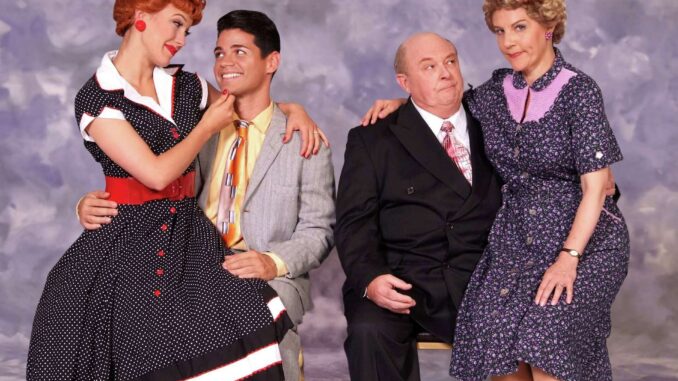
“I Love Lucy” is one of the most iconic and beloved sitcoms in television history. From the hilarious antics of Lucy Ricardo to her charming chemistry with Ricky, audiences have been captivated by Lucy’s quirky and mischievous nature for decades. However, in recent years, a fan theory has surfaced that suggests there’s more to Lucy Ricardo than meets the eye. This theory delves deep into her past, painting a darker and more complex picture of the character that goes far beyond the laughs and slapstick humor we all know and love. Could it be that Lucy Ricardo was hiding a disturbing history all along?
The Rise of Fan Theories Around Classic TV Shows
In today’s digital age, fan theories about classic TV shows are becoming more prevalent than ever. Shows like “Friends” and “The Office” have long been subjects of fan speculation, but now, it seems even beloved characters from old sitcoms aren’t safe from scrutiny. “I Love Lucy” is no exception. The notion that Lucy Ricardo could have a dark past adds a layer of depth to the show that no one saw coming.
What Does This Fan Theory Suggest?
At the heart of this theory is the idea that Lucy Ricardo’s wild, erratic behavior and her desperate need for attention and approval stem from a deeply troubled past. Fans speculate that Lucy may have had traumatic experiences before the events of the show, which could explain her need to constantly insert herself into chaotic situations and her deep desire to be loved by everyone, especially Ricky.
Clues Hidden in Plain Sight
When you look closely, there are moments in “I Love Lucy” that, while meant to be humorous, can be interpreted in a more sinister light. Lucy’s extreme reactions to rejection, her constant lying, and her seemingly manic behavior can all be seen as symptoms of someone who’s suffered through trauma. Could these have been intentional character traits, or were they purely for comedic effect?
Lucy’s Relationship with Ricky: More Than Meets the Eye?

One of the strongest points supporting this fan theory is Lucy’s relationship with her husband, Ricky Ricardo. While their on-screen chemistry was undeniable, there were times when Ricky’s treatment of Lucy was harsh, even by the standards of the time. Some fans believe that Lucy’s fear of disappointing Ricky and her obsession with winning his approval might hint at deeper psychological issues.
Was Lucy a Survivor of Past Abuse?
This fan theory takes an even darker turn with the suggestion that Lucy Ricardo might have been a survivor of abuse before she married Ricky. Her erratic and self-destructive behavior, her desperate need for validation, and even her insistence on always being the center of attention could all be linked to unresolved trauma. If true, this theory suggests that Lucy’s life before meeting Ricky was far more tragic than anyone could have imagined.
Analyzing Lucy’s Personality: From Laughs to Layers
On the surface, Lucy Ricardo is a fun-loving, albeit sometimes over-the-top, character. But could her personality actually be a defense mechanism? Some fans believe that Lucy’s constant scheming and her inability to accept defeat are signs of deeper emotional scars. It’s possible that her humorous antics are masking a lifetime of pain and insecurity.
Lucy’s Desperate Need for Fame
Another aspect of Lucy’s character that lends credence to this theory is her unrelenting desire to be famous. Lucy’s numerous attempts to break into show business, despite her apparent lack of talent, could be seen as more than just comedic fodder. Instead, it could represent her longing for recognition and love—something she might have been deprived of in her past.
A Closer Look at ‘I Love Lucy’ Episodes Through This Lens

If you revisit some of the most popular episodes of “I Love Lucy” with this fan theory in mind, certain moments take on a new meaning. Episodes where Lucy becomes overly obsessed with being part of Ricky’s nightclub act, for example, may be viewed as her deep-seated need for approval. Even her famous “vitameatavegamin” commercial, while played for laughs, could be interpreted as Lucy’s attempt to self-medicate or escape from her internal struggles.
The Role of Comedy in Masking Trauma
Comedy has long been used as a coping mechanism for dealing with difficult emotions and traumatic experiences. Many comedians and comedic actors have been open about their struggles with mental health, using humor as a way to process and express their pain. Could Lucy Ricardo be doing the same?
Does the Show Offer Any Hints at Lucy’s Past?
While “I Love Lucy” never directly addresses Lucy’s past, there are subtle hints scattered throughout the series that suggest there might be more to her story. For instance, Lucy often mentions her childhood in Jamestown, New York, but the details are always vague. Could this be intentional? Was the show purposely avoiding discussing Lucy’s history to keep the focus on the present-day comedy?
Is It All Just Coincidence?
Of course, this fan theory is just that—a theory. It’s entirely possible that Lucy Ricardo was simply written as a comedic character, and all the supposed “clues” are nothing more than coincidences. But the beauty of fan theories is that they allow us to reexamine beloved characters and stories in new and interesting ways.
The Impact of This Theory on ‘I Love Lucy’ Fans
This fan theory has sparked a lively debate among “I Love Lucy” fans. Some find it intriguing and believe it adds depth to Lucy’s character, while others think it’s far-fetched and detracts from the show’s lighthearted nature. Regardless of where you stand, it’s hard to deny that the idea of Lucy Ricardo having a dark past changes the way we view the show.
A Different Kind of Legacy for Lucy Ricardo
If this theory holds any truth, it gives Lucy Ricardo a more complex and nuanced legacy. Instead of just being remembered as a bumbling but lovable character, Lucy becomes a symbol of resilience—a woman who, despite her troubled past, managed to find joy and laughter in her life.